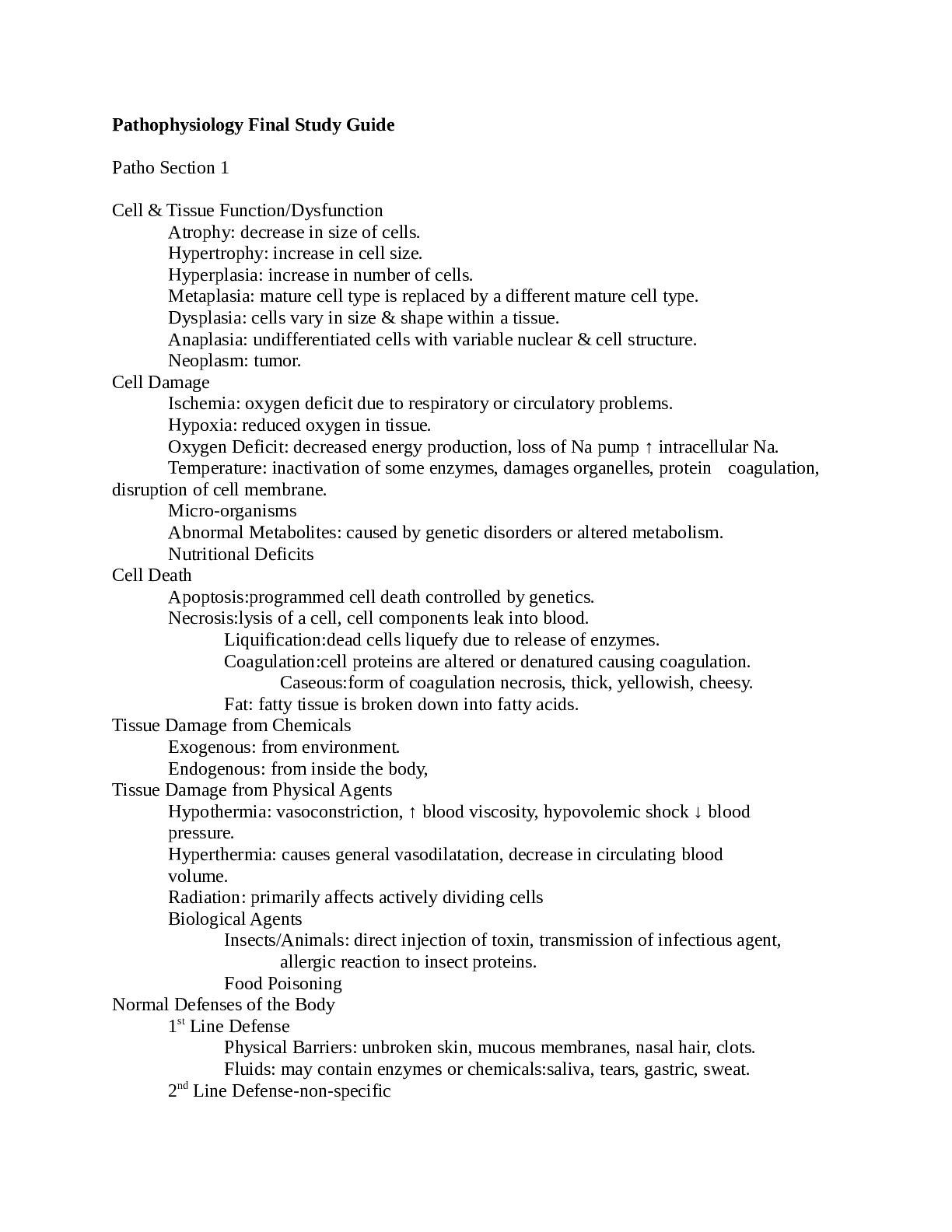*NURSING > QUESTIONS & ANSWERS > Mental Health Exam 3 Concept Guide (Modules 7, 8, 9), LATEST 2022' (All)
Mental Health Exam 3 Concept Guide (Modules 7, 8, 9), LATEST 2022'
Document Content and Description Below
Mental Health Exam 3 Concept Guide (Modules 7, 8, 9) Chapter 12- Somatoform disorders Potential Nursing diagnoses for dissociative disorders: Disturbed personal identity- Amnesia or fugue related t... o a traumatic event Disturbed body image- Symptoms of depersonalization; feeling of unreality or body image distortions Ineffective coping- Alterations in consciousness, memory, or identity Ineffective role performance- Abuse of substances related to dissociation Ineffective coping/ ineffective family coping- disorganization or dysfunction in usual patterns of behavior (absence from work, withdrawal from relationships, changes in role function) Interrupted family processes- disturbances in memory and identity Impaired parenting/ ineffective impulsive control- Interrupted family processes related to amnesia or erratic and changing behavior Anxiety- feeling of being out of control of memory, behaviors, and awareness Spiritual distress/ risk for other-directed violence / risk for self-directed violence- inability to explain actions or behaviors when in an altered state Death anxiety- obsessive fear of contracting or having a serious or terminal illness Somatization- the process of experiencing and communicating psychological distress through physical symptoms symptoms may or may not have a medical basis that can be identified key identifying feature is disproportionate and excessive distressful reaction to the physical symptoms which causes life impairment. Unconscious process Dissociation- The hallmark of dissociative disorders is a disturbance in the normally well-integrated continuum of consciousness, memory, identity, and perception. It is an unconscious defense mechanism to protect the individual against overwhelming anxiety related to past trauma, and ranges from minor to severe. Pts have intact reality testing- meaning they are NOT delusional or hallucinating. Healthy dissociation- Daydreaming, fantasizing, and zoning-out; used to solve problems and relax Severe dissociation- caused by major trauma. o Depending on severity of impact, person may be: Unable to recall a specific event feel unreal/ unattached for short to long periods of time most severe: develop more than 1 personality to help carry the load of extremely severe trauma or abuse Somatic Symptom Disorder- NON INTENTIONAL people with this disorder are extremely persistently preoccupied with and distressed by their perceived health issues demand unnecessary tests, noncompliant with provider recommendations significant life impairment, preoccupation and high anxiety “doctor shopping” when they do not receive the answers from physicians, undergo unnecessary surgeries, invasive diagnostic procedures & drug trials usually diagnosed with depressive and/or anxiety disorders Somatoform Disorder Nursing Interventions offer explanations and support- reduces anxiety (don’t reinforce illness) avoid further reinforcement- direct focus away observe and record frequency and intensity of somatic symptoms- establishes baseline DO NOT imply symptoms are not real (they are real to pts) Assess secondary gains Use straightforward approach- avoid power struggle Reinforce pts strengths and problem-solving abilities- contributes to positive self esteem Stress reduction- provides alternative coping strategies and reduces need for meds Secondary Gains (for somatoform disorders) Benefits derived from the symptoms alone. Ex: in the sick role, patient is not able to perform normal family, work, and social functions and receives extra attention from loved ones. If pts derives personal benefit from the symptoms, relinquishing the symptoms is more difficult. Approach to identifying presence of secondary gains is to ask questions such as: o What abilities have you lost since the development of your symptom(s) ? o How has this problem affected your life? Are there things you can no longer do? o Depending upon the individual patient and your rapport, the nurse might gently approach whether there is anything positive obtained because of the disorder. Hypochondria’s (Illness anxiety disorder) Prominent health anxiety Preoccupied with having or eventually developing a serious illness May or may not present with somatic symptoms, and if so- usually mild. o Unintentional and not under conscious control o Significant distress or dysfunction Preoccupied with belief of having a devastating sickness or disease Inability to function in personal, social, and occupational roles are often impaired Conversion disorder- (also called Functional Neurobiological Symptom Disorder) Presents with one or more symptoms of impaired motor or sensory function Incompatible or exaggeration of recognized neurological conditions, not explained by another mental or medical disorder Causes significant distress to the patient and impaired social or occupational functioning Symptoms: (episodes are typically brief but may become chronic) o weakness or paralysis o abnormal movement o swallowing or speech difficulties o seizures or attacks o sensory loss or anesthesia o symptoms involving the senses (blindness or loss of smell) symptoms are not voluntarily controlled or created. La bella indifference: patients who are highly distressed or show lack of emotional concern. Comorbidities include: childhood abuse, depression, anxiety and personality disorders Nursing intervention: Behavioral therapy Family therapy Hypnosis Anxiolytics- used to reduce anxiety Dissociative Fugue- patient in a fugue state frequently relocates and assumes a new identity while not recalling previous identity or places previously inhabited. The distracters are more consistent with paranoid schizophrenia, generalized anxiety disorder, or bipolar disorder rather lead simple lives not calling attention to themselves, as time progresses the person may remember their former identity and then become amnesic of the time in the fugue state. USUALLY PRECIPITATED BY A TRAUMATIC EVENT Implementation: Dissociative disorders is treated in the community, but may be admitted to a psychiatric unit when suicidal or in need of crisis stabilization Teaching: teaching about illness and instructions in coping skills and stress management. Patients keep a daily journal to increase awareness of feelings and to identify triggers Treatment: psychotherapy- primary and most effective treatment. Therapy needs to be flexible. Techniques include: o Psychoeducation o Processing memories and trauma through talking o Traumatic reenactment o Safety planning o Journaling, o Relaxation techniques [Show More]
Last updated: 1 year ago
Preview 1 out of 21 pages
Instant download

Buy this document to get the full access instantly
Instant Download Access after purchase
Add to cartInstant download
Reviews( 0 )
Document information
Connected school, study & course
About the document
Uploaded On
Nov 12, 2022
Number of pages
21
Written in
Additional information
This document has been written for:
Uploaded
Nov 12, 2022
Downloads
0
Views
60

.png)


 (6).png)

